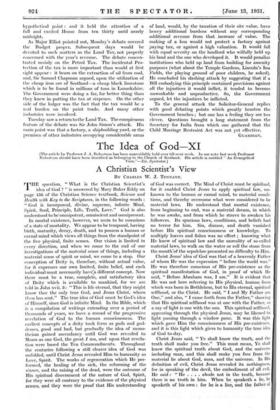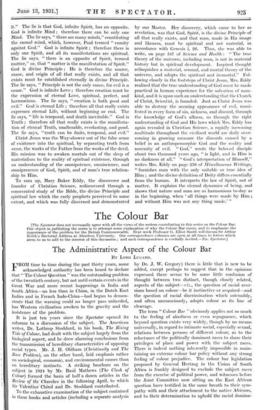The Idea of God XI
[The article by Professor J. A. Robertson has been unavoidably held over till next week. In our note last week Professor Robert3on should have been described as belonging to the Church of Scotland. His article is entitled " An Evangelical View."—ED. Spectator.]
A Christian Scientist's View
BY CHARLES W. J. TENNANT.
THE question, " What is the Christian Scientist's idea of God ? " is answered by Mary Baker Eddy on page 456 of the Christian Science textbook, Science and Health with Key to the Scriptures, in the following words : " God is incorporeal, divine, supreme, infinite Mind, Spirit, Soul, Principle, Life, Truth, Love." God is also understood to be omniscient and omnipresent.
In mortal existence, however, we seem to be conscious of a state of mortality. We appear to be temporal, having birth, maturity, decay, death, and to possess a human or carnal mind which views all things from the standpoint of the five physical, finite senses. Our vision is limited in every direction, and when we come to the end of our investigations of the material sense of things, including a material sense of spirit or mind, we come to a stop. Our conception of Deity is, therefore, without actual value, for it expresses our own limited, finite belief, and each individual must necessarily have:a different concept. Now there must be a true, complete, and satisfactory idea of Deity which is available to mankind, for we are told in John xvii. 3 : " This is life eternal, that they might know thee the only true God, and Jesus Christ, whom thou has sent." The true idea of God must be God's idea of Himself, since God is infinite Mind. In the Bible, which is a compilation of writings extending over a period of thousands of years, we have a record of the progressive revelation of God to the human consciousness. The earliest concepts of a deity took form as gods and god- desses, good and bad, but gradually the idea of mono- theism gained ascendancy until God was revealed to Moses as one God, the great I am, and upon that revela- tion were based the Ten Commandments. Throughout the centuries following a still clearer idea of God was unfolded, until Christ Jesus revealed Him to humanity as Love, Spirit. The works of regeneration which He per- formed, the healing of the sick, the reforming of the sinner, and the raising of the dead, were the outcome of His spiritual discernment of the nature of God, Spirit, for they were all contrary to the evidence of the physical senses, and they were the proof that His understanding of God was correct. The Mind of Christ must be spiritual, for it enabled Christ Jesus to apply spiritual law, un- known to the human or carnal mind, to material condi- tions, and thereby overcome what were considered to be material laws. He understood that mortal existence, from beginning to end, was a material dream, in which he was awake, and from which he strove to awaken his followers. Its spurious laws, conditions, and beliefs had no terror for him. Sin, disease, and death vanished before His spiritual consciousness or knowledge. To multiply loaves and fishes was no effort ; knowing what He knew of spiritual law and the unreality of so-called material laws, to walk on the water or roll the stone from the mouth-of the sepulchre presented no difficulty to Him.
Christ Jesus' idea of God was that of a heavenly Father of whom He was the expression " before the world was." He was therefore conscious of His pre-existence as the spiritual manifestation of God, in proof of which He said, " Before Abraham was, I am." It is evident that He was not here referring to His physical, human form which was born in Bethlehem, but to His eternal, spiritual selfhood, or the Christ. He said, " I and My Father are One," and also, " I came forth from the Father," showing that His spiritual selfhood was at one with the Father, as a ray of light is one with the sun. This spiritual selfhood, appearing through the physical Jesus, may be likened to light passing through a window pane. It was this light which gave Him the consciousness of His pre-existence, and it is this light which gives to humanity the true idea of God to-day.
Christ Jesus said, " Ye shall know the truth, and the truth shall make you free." This must mean, Ye shall know the spiritual truth about God, and the universe including man, and this shall make you free from the material lie about God, man, and the universe. In His definition of evil, Christ Jesus revealed its nothingness, for in speaking of the devil, the embodiment of all evil, He said : " He . . ; . abode not in the truth, because there is no truth in him. When he speaketh a lie, he speaketh of his own : for he is a liar, and the father of it." The lie is that God, infinite Spirit, has an opposite. God is infinite Mind ; therefore there can be only one Mind. The lie says, " there are many minds," constituting the carnal mind, which, however, Paul termed " enmity against God." God is infinite Spirit ; therefore there is only one Spirit, and all its manifestations are spiritual. The lie says, " there is an opposite of Spirit, termed matter," or, that " matter is the manifestation of Spirit." God is divine Principle ; He is therefore the source, cause, and origin of all that really exists, and all that exists must be established eternally in divine Principle. The lie says, " Principle is not the only cause, for evil is a cause." God is infinite Love ; therefore creation must be the expression of eternal Love, spiritual, perfect, and harmonious. The lie says, " creation is both good and evil." God is eternal Life ; therefore all that really exists expresses eternal Life, without beginning or end. The lie says, " life is temporal, and death inevitable." God is Truth ; therefore all that really exists is the manifesta- tion of eternal Truth, unalterable, everlasting, and good. The lie says, "truth can be finite, temporal, and evil."
Christ Jesus was the Way-shower out of the false sense of existence into the spiritual, by separating truth from error, the works of the Father from the works of the devil. His mission was to awaken mortals out of the sleep of materialism to the reality of spiritual existence, through an understanding of the omnipotence, omniscience, and omnipresence of God, Spirit, and of man's true relation- ship to Him.
To sum up, Mary Baker Eddy, the discoverer and founder of Christian Science, rediscovered through a consecrated study of the Bible, the divine Principle and spiritual law which the early prophets perceived to some extent, and which was fully discerned and demonstrated by our Master. Her discovery, which came to her as revelation, was that God, Spirit, is the divine Principle of all that really exists, and that man, made in His image and likeness, must be spiritual and not material, in accordance with Genesis i, 26. Thus, she was able to write, on page 547 of Science and Health : " The true theory of the universe, including man, is not in material history but in spiritual development. Inspired thought relinquishes a material, sensual, and mortal theory of the universe, and adopts the spiritual and immortal." Fol- lowing closely in the footsteps of Christ Jesus, Mrs. Eddy realized that the true understanding of God must be made practical in human experience for the salvation of man- kind, and it is upon such an understanding that the Church of Christ, Scientist, is founded. Just as Christ Jesus was able to destroy the seeming appearance of evil, mani- fested in every form of sin, sickness, and discord, through the knowledge of God's allness, so through the right understanding of God and His laws which Mrs. Eddy has again revealed in Christian Science, a rapidly increasing multitude throughout the civilized world are daily over- coming in growing measure the discords caused by a belief in an anthropomorphic God and the reality and necessity of evil. " God," wrote the beloved disciple about two thousand years ago, " is light, and in Him is no darkness at all." " God's interpretation of Himself," writes Mrs. Eddy on page 258 of Miscellaneous Writings, " furnishes man with the only suitable or true idea of Him ; and the divine definition of Deity differs essentially from the human. It interprets the law of Spirit, not of matter. It explains the eternal dynamics of being, and shows that nature and man are as harmonious to-day as in the beginning, when ' all things were made by Him ; and without Him was not any thing made.' "







































 Previous page
Previous page